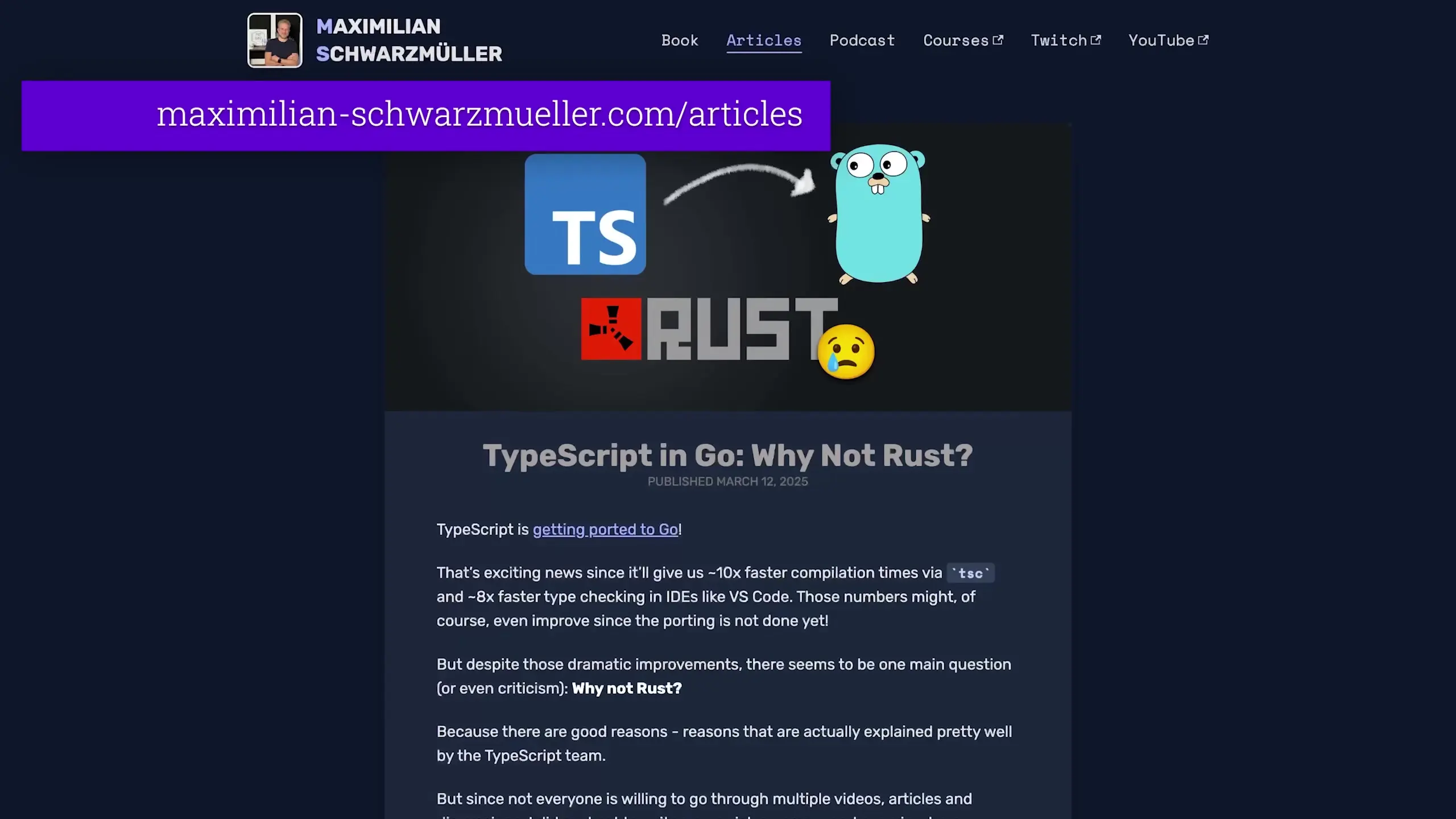
A major shift is coming to the TypeScript ecosystem. The TypeScript team has announced they're porting the TypeScript compiler and type checker to Go, with promises of up to 10x better performance. This significant change is planned for the TypeScript 7 release, representing one of the most substantial architectural shifts in the language's history.
This isn't a rewrite but a port - an important distinction that has significant implications for TypeScript users and the broader JavaScript ecosystem. Let's explore what this means, why Go was chosen over other languages like Rust, and what benefits developers can expect.
What This Means for TypeScript Developers
First and foremost, this change doesn't mean your TypeScript knowledge is obsolete or that your code will need to be rewritten. The TypeScript language itself isn't changing - only the underlying compiler implementation is being ported from JavaScript to Go.
The benefits will come automatically as a free performance boost when you update to TypeScript 7. You won't need to change your code or learn new syntax. The TypeScript team is committed to maintaining backward compatibility through this transition.
Key Benefits of the Go-Powered TypeScript
- Faster compilation times for TypeScript projects
- Significantly improved IDE performance with quicker type checking
- Reduced waiting time when loading large projects or navigating complex codebases
- Faster type inference and error reporting
- Potential for more advanced type checking features that weren't previously possible due to performance constraints
Many developers have experienced the frustration of opening a TypeScript file and waiting for the type checker to catch up. Those delays - sometimes lasting several seconds - should be dramatically reduced with the Go-powered compiler.
Why Go Instead of Rust? The Pragmatic Decision
The announcement sparked considerable discussion in the developer community, with many questioning why Go was chosen over Rust - a language that has gained significant popularity for systems programming and performance-critical applications.

The TypeScript team outlined several pragmatic reasons for choosing Go:
Porting vs. Rewriting: A Critical Distinction
This is a port, not a rewrite. The team is essentially taking the existing JavaScript codebase and adapting it to work in Go, rather than reimplementing TypeScript from scratch. This approach is significantly faster and less risky than a complete rewrite.
A full rewrite would potentially allow for more optimization but would take much longer to complete and introduce more risk of subtle behavioral changes that could break existing TypeScript code in the wild.
Code Similarity Between JavaScript and Go

Go's syntax and programming model have more similarities to JavaScript than Rust does. This makes the porting process more straightforward and reduces the chance of introducing bugs or behavioral differences. The TypeScript team demonstrated in their announcement that the JavaScript code and the Go code it's being ported to look remarkably similar in many cases.
Maintenance Considerations
The team plans to maintain both the JavaScript and Go codebases for the foreseeable future. This dual maintenance strategy is more feasible when the codebases are structurally similar, making Go a more practical choice than languages with very different paradigms.
This approach also makes it easier for external contributors to port their contributions from one codebase to the other, ensuring the community can continue to participate in TypeScript's development.
Addressing Community Concerns
The announcement has sparked various discussions in the developer community. Some valid concerns have been raised, particularly around Go's performance in WebAssembly environments, which is relevant for web-based code editors and playgrounds that run the TypeScript compiler in the browser.
Evan You, creator of Vue.js, pointed out that Go's WebAssembly performance might not be optimal compared to Rust. This could impact tools that need to run TypeScript compilation in browser environments.
The TypeScript team acknowledges these trade-offs but emphasizes that their primary goal is to deliver real performance improvements to users as quickly as possible, rather than pursuing theoretical maximum performance that might take years to achieve.
Backward Compatibility and Future Features
The TypeScript team has made it clear that backward compatibility is a top priority. They're committed to maintaining the JavaScript-based version alongside the Go version for as long as necessary, ensuring a smooth transition for the ecosystem.
However, they've also noted that the performance improvements from Go will enable new features that weren't previously possible due to performance constraints. This means that from TypeScript 7 onward, there may be some divergence between the capabilities of the JavaScript and Go versions.

These new capabilities could include more sophisticated type inference, deeper code analysis, and other features that require the additional performance headroom provided by Go.
Timeline and Availability
According to the official announcement, the Go-powered TypeScript compiler is planned for release with TypeScript 7. The porting process has been underway for several months and will continue for some time before it's complete.
The team hasn't provided a specific release date, but this represents a significant milestone in TypeScript's evolution that developers should be preparing for.
Pragmatic Engineering: Choosing Real Improvements Over Theoretical Perfection
This decision exemplifies a pragmatic approach to software engineering. While a Rust rewrite might theoretically deliver even better performance in some scenarios, the Go port offers substantial real-world improvements that can be delivered in a reasonable timeframe with less risk.
As with many engineering decisions, it's about making practical trade-offs. A 10x performance improvement that's actually delivered is far more valuable than a theoretical 20x improvement that might never materialize due to implementation challenges.
Conclusion: A Pragmatic Step Forward for TypeScript
The decision to port TypeScript to Go represents a significant but carefully considered evolution for one of the most important tools in modern web development. By prioritizing compatibility, achievable performance gains, and maintenance considerations, the TypeScript team is taking a pragmatic approach to improving developer experience.
For TypeScript developers, this change promises substantial performance improvements without requiring code changes or learning new concepts. It's a rare example of getting something for nothing - faster compilation, better IDE support, and potentially new capabilities, all while maintaining backward compatibility.
As TypeScript continues to evolve, this architectural shift may enable new features and capabilities that weren't previously possible, further cementing TypeScript's position as an essential tool for JavaScript development.
Let's Watch!
TypeScript Goes Golang: 10x Performance Boost Coming in TypeScript 7
Ready to enhance your neural network?
Access our quantum knowledge cores and upgrade your programming abilities.
Initialize Training Sequence